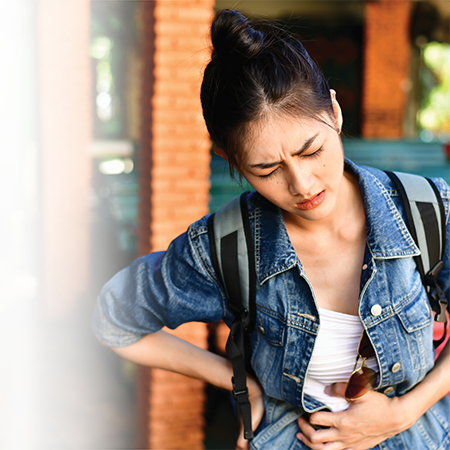Need a consultation related to the health condition discussed in this article? Schedule an appointment with your pharmacist at a time that works for you.
No one dreams of having travellers’ diarrhea during a trip in a foreign country. Here is how to avoid the unpleasantness of this rather common problem.
Travellers' diarrhea or the infamous "turista"
It’s wonderful to be able to bring home precious memories from a trip. However, we could do without the memories of travellers’ diarrhea! This illness, commonly called “turista”, can be particularly unpleasant, but is rarely very serious. It is probably one of the most common illnesses affecting travellers.
Although it is most often caused by bacteria, travellers’ diarrhea can be caused by an infection, virus, or parasite.
It is possible to get travellers’ diarrhea in many parts of the world, for example:
- Asia
- Africa
- Mexico
- Central America
- South America
- Caribbean
- Certain Mediterranean or Middle Eastern countries
How to recognize travellers' diarrhea
Travellers’ diarrhea is characterized above all by the passing of loose or watery stools (diarrhea). Other possible symptoms include:
- fever
- nausea and vomiting
- loss of appetite
- abdominal cramps
- flatulence and bloating
- fecal urgency
- feeling of general malaise, and
- blood or mucus in the stool
Symptoms can appear at any time during a trip and up to 7 to 10 days after returning. Without treatment, they usually last between 1 to 5 days, but sometimes more than a week.
How can travellers’ diarrhea be prevented?
The germs responsible for travellers’ diarrhea most often spread through water or contaminated food. On rare occasions, it spreads through person-to-person contact. Here are some tips to avoid contamination:
- Never drink tap water; drink only bottled or purified water.
- Brush your teeth with bottled or purified water as well.
- Make sure the ice cubes put in your drinks are not made from tap water.
- Do not consume anything that has not been boiled, cooked or peeled.
- Peel the fruits that you eat yourself.
- Do not consume non-pasteurized milk products.
- Avoid fresh foods that have been left out at room temperature for a long time: guacamole, fruit or chicken salad, food from buffets, food stands, etc.
- Refrain from eating undercooked foods (e.g. meat, seafood, eggs, etc.).
- Try to stick to the following rule: it is best to eat hot foods hot, and cold foods cold.
- Wash your hands thoroughly before eating or drinking and after going to the toilet.
- Never touch a wild or stray animal.
Avoid close contact (such as kissing) with an infected person.
How can travellers’ diarrhea be treated?
Preventing dehydration is one of the important aspects of treatment. The loss of fluids and electrolytes caused by travellers’ diarrhea can have serious health implications. Therefore, it is important to drink plenty of water to prevent this problem.
In some cases, the use of rehydration solutions, such as those available at the pharmacy, may be considered. Powdered formulas (to be mixed with water) have the advantage of being easier to carry in luggage. These products can be considered "essentials" to include in your health kit when travelling to a risk area.
In anticipation of this type of trip, you can get a prescription for a treatment to be started in case of symptoms suggesting travellers’ diarrhea. Note that you can consult with a pharmacist to obtain a prescription and the necessary advice. The person who prescribes the treatment will explain how and when to take it, depending on the signs and symptoms and their severity. It is important that the treatment be followed exactly as recommended by the prescriber.
Some medications can alleviate symptoms like diarrhea (loperamide and bismuth salicylate) or nausea (dimenhydriante). Most of these medications are available over-the-counter, but you should always ask your pharmacist for advice before purchasing them. Antibiotics are also part of the therapeutic arsenal for travellers’ diarrhea and can be considered for moderate to severe cases. Ask your pharmacist if this might be a useful prescription for you to have. If so, they may prescribe it following an evaluation.
When travellers’ diarrhea occurs, some people turn to probiotics. Indeed, some data suggests that they help maintain intestinal health, and to prevent or relieve diarrhea in this context. Discuss this issue with your pharmacist to obtain additional information.
When should you see a doctor?
It is advisable to seek a doctor’s advice if the above-mentioned symptoms last for more than 10 days or in the following situations:
- high fever (³40°C)
- severe abdominal cramps or pain
- significant vomiting
- bloody stools
- inadequate response to treatment, and
- the presence of any unusual or alarming symptoms (confusion, loss of consciousness, etc.)
Speak to your pharmacist for additional information about travellers’ diarrhea and its treatments.



